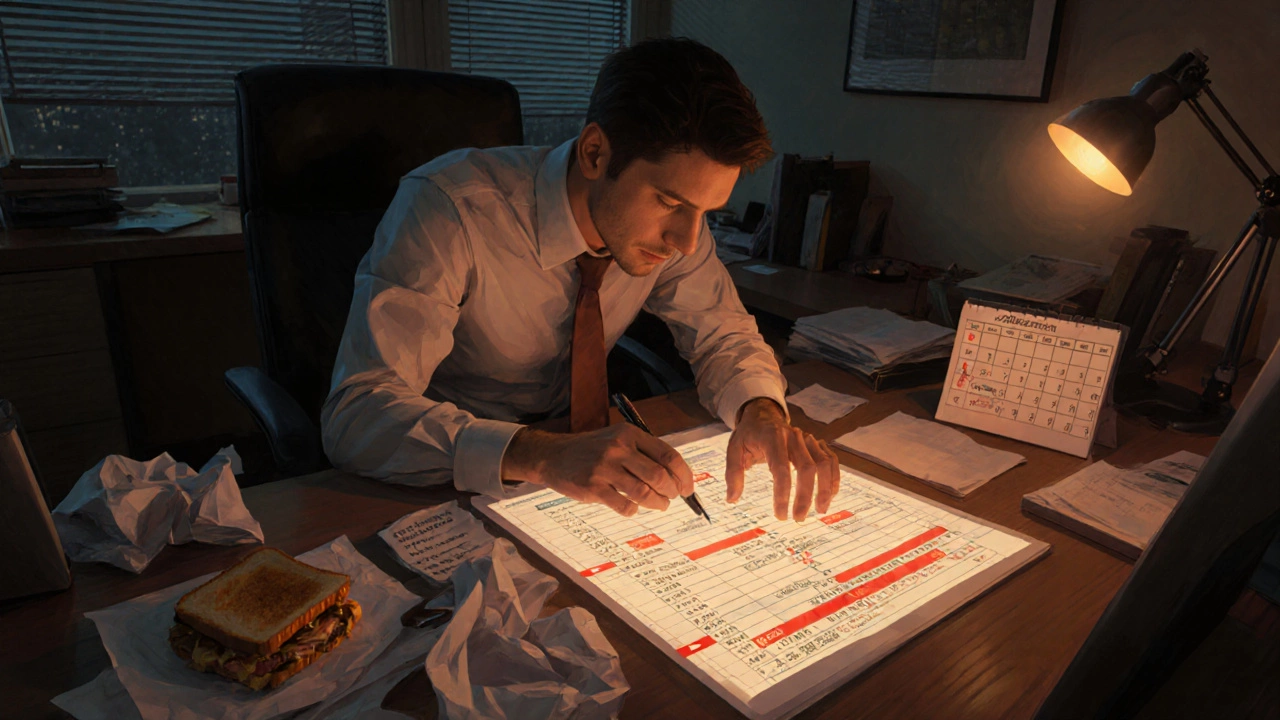
Exam Pass Rate Calculator
Estimate your chances of passing these challenging professional exams based on data from the article. Your background and exam choice significantly impact pass rates.
Select an Exam
Your Background
Estimated Pass Rate
Important: These figures are based on national averages from the article. Your actual pass rate may vary based on study habits, preparation time, and individual circumstances.
What this means:
Ask anyone who’s taken it - the USMLE isn’t just hard. It’s a marathon with no finish line in sight. Thousands of medical students spend years preparing for it. Some study 12 hours a day. Others drop out. And yet, every year, over 40,000 people sit for Step 1 alone. It’s not the number of questions. It’s the weight of what’s on the line: your future as a doctor in the United States.
Why the USMLE Stands Apart
The United States Medical Licensing Examination (USMLE) isn’t one test. It’s three steps, spread over years, each more brutal than the last. Step 1 tests your grasp of basic sciences - anatomy, biochemistry, pharmacology, microbiology. You’re expected to know how every drug interacts, every enzyme functions, every disease presents. The exam is 280 multiple-choice questions. You get seven hours. No breaks between sections. One wrong answer won’t sink you. But 20 could.
Step 2 CK (Clinical Knowledge) is even more intense. Now you’re not just memorizing facts - you’re diagnosing patients from scratch. A 62-year-old man with chest pain, elevated troponin, and a history of smoking. What’s the next step? Is it a stress test? An ECG? A CT angiogram? The questions don’t give you hints. They assume you already know the algorithm. And if you don’t, you fail.
Step 3 is the final gate. It’s two days long. You’re managing real-time patient cases. You have to decide when to admit, when to discharge, when to call a code. One mistake in judgment - and you’re not just failing an exam. You’re failing a patient.
The pass rate? Around 94% for U.S. medical school grads. Sounds high, right? But for international medical graduates, it’s closer to 70%. That gap isn’t about intelligence. It’s about training. U.S. schools train you to think like a doctor from day one. International schools teach you to pass tests. The USMLE exposes that difference - brutally.
The Bar Exam: A Close Second
If the USMLE is a physical endurance race, the bar exam is a mental labyrinth. Every state has its own version, but the Uniform Bar Exam (UBE) is the most common. It’s a two-day test with 200 multiple-choice questions and six essay questions. Then there’s the Multistate Performance Test - two 90-minute tasks where you’re handed a fake case file and asked to draft a motion, a client letter, or a settlement agreement.
Law schools don’t prepare you for this. They teach you theory. The bar exam tests execution. Can you apply the rule to the facts? Can you spot the exception? Can you write clearly under pressure? In 2024, the national pass rate for first-time takers was 78%. That means one in five law school graduates didn’t make it. And in California? The pass rate dropped to 55%. Some candidates take it five, six, even seven times.
What makes it worse? The cost. A single attempt can run $1,000 to $1,500. Add prep courses, books, lost income from not working - and you’re looking at $10,000 to $20,000 just to become eligible to practice law. No other profession asks you to pay that much just to get licensed.
CPA Exam: The Financial Gauntlet
Accountants face their own beast: the CPA exam. Four sections. Auditing and Attestation. Business Environment and Concepts. Financial Accounting and Reporting. Regulation. Each section is four hours long. You have 18 months to pass all four after you pass your first. If you miss that window? You lose everything and start over.
The exam doesn’t test memorization. It tests application. You’re given a financial statement with red flags. Can you spot the fraud? You’re handed a tax scenario with deductions, credits, and loopholes. Can you optimize legally without crossing the line? The questions are designed to trip you up - not because they’re obscure, but because they’re realistic. Real accountants face these decisions every day.
Pass rates hover around 50% per section. That’s half of all candidates failing each time. Many take months to retake a failed section. Some drop out after two tries. The average candidate spends 300 to 400 hours studying - often while working full-time. No one gets a second chance to make a first impression.

Why These Exams Are So Hard - And Why That Matters
These aren’t tests of memory. They’re tests of competence. The U.S. doesn’t hand out licenses lightly. Doctors, lawyers, and accountants hold real power over people’s lives. One mistake can cost a life, a fortune, or a business. The exams are designed to filter out those who aren’t ready - not to punish them.
Compare that to other countries. In some places, medical licensing is a formality. In the U.S., it’s a rite of passage. You don’t just learn the material. You become the professional. The stress isn’t arbitrary. It’s necessary.
That’s why these exams aren’t just hard - they’re respected. People who pass them carry a quiet confidence. They’ve been through fire. They know what it means to push past exhaustion, doubt, and fear. And when they walk into a hospital, courtroom, or boardroom, they’re not just qualified. They’re proven.
What About Other Exams? SAT, GRE, MCAT?
People often mention the SAT or GRE as tough. But those are admissions tests. They don’t determine if you can practice a profession. The MCAT is harder than the SAT - no doubt. But even the MCAT is a stepping stone. You take it to get into med school. The USMLE is what gets you out of it - and into a white coat.
The same goes for the LSAT. It’s a gatekeeper. The bar exam is the wall. You can’t climb over it with good grades or a strong personal statement. You need to know the law - inside and out - and be able to use it under pressure.

Who Succeeds? And Who Doesn’t?
There’s no secret formula. But the people who pass these exams share three things:
- Consistency. They study every day, even when they don’t feel like it.
- Practice under pressure. They simulate test conditions - timed sections, no distractions, full-length mocks.
- Support. They have mentors, study groups, or counselors who’ve been through it.
The ones who fail? Usually not because they’re dumb. They burn out. They isolate themselves. They think they can cram in the last month. They don’t take breaks. They don’t sleep. They don’t eat right. The exam doesn’t just test knowledge - it tests your ability to take care of yourself.
Is There a Way to Make It Easier?
No. And that’s the point.
These exams exist because society demands excellence. You wouldn’t want a doctor who passed a 60-question quiz. You wouldn’t want a lawyer who passed a multiple-choice test after reading a summary. You want someone who’s been tested - repeatedly, rigorously, and fairly.
The toughest exam in the USA isn’t the one with the most questions. It’s the one that decides whether you’re allowed to serve others. And that’s why it’s so hard.
Is the USMLE harder than the bar exam?
It depends on what you mean by "harder." The USMLE is longer, more technical, and requires deeper scientific knowledge. The bar exam is broader, more abstract, and demands sharp legal reasoning under pressure. Both have pass rates below 80% for non-traditional candidates. Neither is easy. But USMLE candidates often spend more total hours studying - and the stakes are higher, since failure can mean abandoning a decade-long medical career.
Can you pass the CPA exam without a degree in accounting?
Yes - but only if you meet your state’s education requirements. Most states require 150 semester hours, including specific accounting and business courses. You don’t need a bachelor’s in accounting, but you do need to have taken the right classes. Many people with degrees in finance, economics, or even engineering take extra courses to qualify. The exam itself doesn’t care about your major - only whether you know the material.
Why is the California bar exam so much harder than others?
California has its own set of laws that aren’t covered in the UBE. It tests state-specific rules in contracts, torts, and criminal law - many of which are more complex than federal standards. The essay section is also more demanding, requiring precise application of nuanced legal doctrines. Plus, California allows non-accredited law school grads to sit for the exam, which increases the pool of underprepared candidates. The result? A pass rate that’s often 20 percentage points lower than the national average.
Do you need to be a genius to pass these exams?
No. You need discipline. Most people who pass these exams aren’t geniuses - they’re consistent. They wake up early. They review flashcards during lunch. They take full-length practice tests every week. They learn from their mistakes. Intelligence helps, but persistence wins. The biggest predictor of success isn’t IQ - it’s how many hours you put in, and whether you stick with it when you’re exhausted.
What happens if you fail the USMLE Step 1 three times?
After three failures, you must wait at least 12 months before retaking it. You also need to complete additional education or training approved by the USMLE program. Many candidates use this time to enroll in remedial courses, work with tutors, or even take time off to reset mentally. Some never return. For others, it’s a turning point - the moment they finally learn how to study effectively.
What Comes After Passing?
Passing isn’t the end. It’s the beginning.
Doctors go into residency. Lawyers join firms or start practices. Accountants get hired by Big Four firms or go solo. The exams were just the first hurdle. The real work starts after you get your license.
But here’s the truth: if you made it through the USMLE, the bar, or the CPA - you’ve already proven you can handle pressure. You’ve already shown you won’t quit when things get hard. That’s why employers trust you. That’s why patients trust you. That’s why society lets you carry the weight of these professions.
The toughest exam in the USA isn’t the one with the most questions. It’s the one that decides whether you’re ready to serve.




